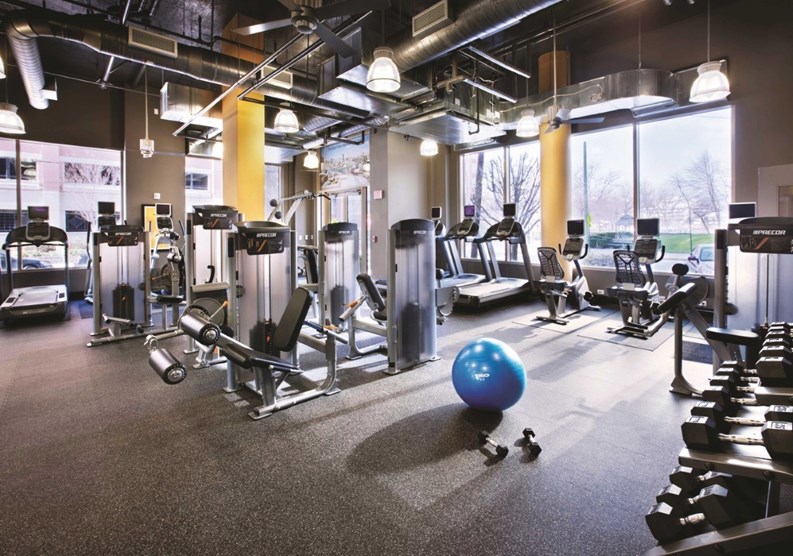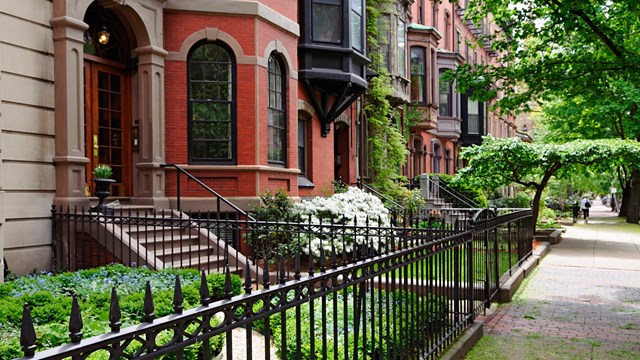While a pool and a clubhouse used to be the hallmark of luxury condo living, the whole concept of upscale condo amenities has exploded in recent years with the construction of condo units tied to high-end hotels. This has added perks ranging from around-the-clock hospitality and concierge services to the many, more-tangible items enjoyed by residents of million-dollar-plus condo properties. Those tangible perks, from gourmet kitchens to riding rings, may be impressive, but it may be certain intangibles that upscale buyers are really seeking—whether they’re aware if it or not.
The ultra-high luxury condominium buildings that dot the waterfronts and downtown squares of Boston provide a good example. In New England, they are a recent phenomenon, and as such, are in a class by themselves. Joshua Golden, founder and managing partner of Luxury Residential Group, LLC, of Boston, points out that “ten years ago, these luxury high-rise properties didn’t even exist.”
He explains that some of the newest high-rise condo buildings are attached to luxury hotels and often share services and physical facilities. For example, Millennium Place residences are part of the Ritz Carlton Hotel complex, which has the L.A. Sports Club on site. Endless choices at the club cater to all ages and abilities, and include a basketball court, squash courts, 75-foot pool, boxing studio, private or group instruction, a spa, a café/restaurant, clinics, child care with enrichment programs, sport leagues and social events. And that’s not even counting the hotel’s restaurants, bars and personal services.
Buyers interested in Boston condominium properties include “people who travel a lot and want everything turn-key, with on-site staff taking care of daily details… so they don’t have to do a thing,” Golden notes, “although another type of high-end buyer [that we see] is coming in from the suburbs may be more interested in ‘brownstone’ living,” where residents are more on their own.”
“A lot of buyers are from overseas,” he continues, “with [especially] Asian money coming in… from Hong Kong, Malaysia… as well as the Middle East and Europe. They’re interested in these upscale units. Sometimes they have kids attending college in town, and they actually need a place to live, in a property that is also appealing as an investment.”
The most noticeable amenity, shared by virtually all properties billed as “luxury,” is the 24/7 availability of concierge service. Golden points out, “Whatever a resident could ask for, the concierge can arrange it—get tickets to shows, restaurant reservations, or offer advice on vendors,” for anything from catering a dinner to dog walking or babysitting.
“All these residents need to know is that the concierge will take care of everything,” says Golden, noting that beyond the concierge are several levels of staff and management. “Some properties even use outside management for financials, handling fees and doing the books.”
Above and beyond pampered service, he admits, luxury unit owners have fairly basic needs, “They just want nice views, and to be secure.”
A Nice View… and Three Bathrooms
Tim Marsh, co-owner of Marsh Properties in Boston, describes his condo market as “predominately ‘tier 1, doorman’ buildings, in downtown locations.”
Just like the aforementioned Millennium Place at the Ritz Carlton, he adds, “the newest, high-priced condo properties have a hotel component… It’s very popular.” And while the nationwide real estate crash of recent years definitely caused a bump in the road for Boston’s newest entries into the luxury market, demand seems to be on the rebound. Although it may have had a rough start, financially, “The W Hotel and Condos project has had five closings [in the first quarter of 2012], and that’s at a selling price of $902.00 per square foot,” notes Marsh. “It’s a similar situation at the Mandarin Oriental, with four [unit] sales in [early] 2012 at a price tag of $1,555.00 per square foot.”
He notes that the hotel component helps sell the adjacent condo units, “especially to foreign buyers… who are attracted to the familiarity of the brand. Plus, today’s buyers want to be pampered. They’re focused on service and like to be doted on.” The extra service built around these luxury condos may explain another trend—the absence of live-in help. Marsh explains, “Sometimes people will buy a unit and then buy or rent a smaller unit nearby for an au pair or assistant. You seldom see household staff living within the [owner’s] unit.”
When a new buyer at this level takes ownership, “they’re looking for very high-end finishes,” Marsh points out, so the potential for redesigning and decorating is limitless. Whole interiors often get redone as trends—and owners—change. Whether a luxury condo building is old or new, he explains, “today’s buyers want to put their stamp on the unit… and may completely redo it, often taking them completely down to the studs—you’ll see this even in a place that was just remodeled.”
Consequently, trends from just a few years ago are quickly replaced. Bathrooms have multiplied, and the Jacuzzi or jetted tub of the 1990s has been dumped in favor of a soaking tub, paired with an oversized shower stall that may offer strategic shower heads or a steam shower option. The bidet from 20 years ago that was a must-have in every master bath is no longer seen, while the simple low-flush toilet has evolved into a high-tech wonder.
In the all-important “professional” kitchens, Marsh adds, “a lot of my customers are now using lighter colors… in stone surfaces of granite or marble, white or off-white cabinets, and panels to match the cabinetry on the facing of appliances.” He contends that the most compelling amenity may just be the benchmark of realty sales—location. Nothing can ramp up a unit’s sale price like proximity to Boston Common. Right downtown is where everyone wants to be—and it’s where parking is at such a premium, it’s become an amenity in itself.
“These buildings all have garage parking underneath,” he continues. “Garage parking is critical, and even though many residents prefer parking their own cars, valet service is almost always provided as an option. Those are the prime requirements of these buyers—security, garage space and 24-hour concierge service. Also, the buildings that have a hotel component can also offer housekeeping and food service,” so the unit owner is like any hotel guest.
He also describes his buyers’ insistence on “a turn-key lifestyle. It’s their primary interest, because they have homes elsewhere. In these luxury properties, someone is on site to take care of things when they’re away,” whether it’s accepting deliveries or supervising maintenance staff or tradespeople who need to enter the unit.
Paul Leys is broker-owner of Gustave White Sotheby’s International Realty in Newport, Rhode Island. His market is dominated by a number of old mansions that were converted to condos in the 1970s and ‘80s. “The developers at the time did a great job of saving these historic properties, which otherwise would have been razed… These were 10,000 to 12,000-square-foot structures.”
“For high-end buyers in the Newport area, the main amenity is the ocean. It had better be waterfront, or have water access, like dock space, or a terrific, unobstructed water view,” he states. “On top of that, a pool and tennis courts are a typical addition.”
Leys notes that many of his buyers are also, “looking for a good, well-run, strong association. They don’t want to buy into a community that has had squabbling or legal issues. Maybe they have been burned in the past, so they’re paying attention [with] due diligence before signing on.” He adds that, “Buyers at this high-end level don’t mind paying high fees as long as it’s justified.” This may explain one more amenity enjoyed by luxury condo owners—having a board of directors who are spared from constant money worries and the problems of under-funded budgets.
From Sailboats to Saddles
Leys mentions that one residential property in his area with some truly unique amenities is Carnegie Abbey Private Sporting Estate in Portsmouth, Rhode Island. Ken Brennan, membership director for Carnegie Abbey Club, touts its numerous choices, “There’s nothing else like it from Maine to D.C.” The list includes a yacht club with dock space for boating, tennis courts, a spa facility, dining, an equestrian center with seven miles of trails and a wide range of residential properties in a gated community. A real standout is the waterfront, Scottish-links style golf course staffed by PGA professionals… complete with caddie master, multi-tee practice range, dedicated short-game area, plus two additional driving ranges and a pair of putting greens—with professional instruction available. It was constructed in 1999 as the initial phase of the project.
“It’s the perfect getaway home for a family—everyone can enjoy what they like,” says Brennan, “if dad wants to play golf, and mom likes horseback riding… plus there’s a Camp Carnegie for youngsters and a Teen Camp that offers surfing, sailing and hiking.” And it’s all available on the 400-acre property, which formerly housed the Carnegie Abbey boarding school.
Capturing that all-important amenity of panoramic views is the 22 -story Tower at Carnegie Abbey housing 79 upscale condo units that vary from one to six bedrooms—and feature the requisite concierge. It was completed in 2008 and supplements the community’s neighborhoods of single family homes; the largest of which [to date] is 12,000 square feet.
Personnel to Property—
The Right Fit is Crucial
“There definitely are an increasing number of amenities available,” states Jim Collins, CPM. As executive vice president and director of property management at The Niles Co., Inc., of Quincy, Massachusetts, he emphasizes the “personal touch” and importance of personnel. “In our high-end properties, which are mostly in greater Boston, you won’t find one without 24-hour concierge service, usually along with the now-requisite health club with pool.
“In addition to a concierge,” he continues, “there’s an on-site management presence—people want everything to be handled in house. Management has to be very well qualified, with hospitality skills and experience. The [management] staff who are successful tend to form a relationship with unit owners and become a fixture [at the property]. There’s a trust that needs to develop. Although this is a desirable factor at any condo community,” he contends, “it’s more critical in these luxury buildings. There’s confidentiality that has to be maintained. You’re always trying to match the skills of your staff to the property they’re working in.
“Our main thing is to have the right people [on the management team] who can meet the expectations of the residents. The management people who succeed are the ones who enjoy that environment. They’re proud to say they work at this or that [notable] building.”
So the ultimate amenity may not be a European spa or a putting green, but a staff that understands, appreciates and can cater to residents in that specialized, luxury market.
Marie Auger is a Massachusetts freelance writer and a frequent contributor to New England Condominium.






Leave a Comment